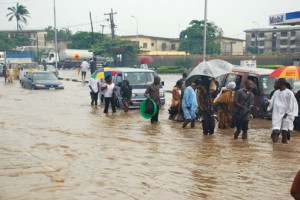The Nigerian Meteorological Agency (NIMET) recently predicted that several cities in Nigeria would be affected by flooding if ‘proper measures’ were not taken. Already, about one hundred people have died in Jos, and six local government areas in Plateau state affected. Also, parts of Bauchi, Benue and Nasarawa are facing loss of lives and property from flooding.
The issue is, after the flood warning, what next?
Does it make sense for government to warn Nigerians about impending flooding, and then leave them to their own devices? If the Jos flooding has claimed as many lives, what would happen when the deluge reaches Lagos, Port Harcourt, Kano, Abia, Akwa Ibom, Ogun, Cross Rivers, Gombe, Kano and Jigawa as predicted by NIMET? In Plateau State alone, the Nigerian Red Cross confirmed that more than 10,000 people have lost their homes.
What are the roles of the Federal Ministries of Environment and Water Resources? Can the National Emergency Management Agency alone handle the impending disasters? Is it sufficient for NIMET to simply advise the affected states to clear their drainages and waterways to minimise the impact of flood?
Acting Director General of NIMET, Mrs. Julie Ukeje was recently quoted as saying, “The activities that we are carrying out to ensure that the public is well informed and alerted about flooding is that we are constantly reviewing and updating our publications. For the ones that were usually issued monthly, we are now trying to change the pattern and from what we are seeing, we will have real problem because they are all indicative that the soil in the entire country is very moist”.
Considering that the lives and property of tens of thousands may be at stake, government should go beyond mere ‘warning’. There should be a concerted effort to study environmental patterns and calculate economic costs to help design specific projects to address the challenges.
In Europe, according to studies commissioned by the World Bank, it is estimated that hydro-meteorological information and early warning systems save several hundreds of lives per year, and prevents between 460 million and 2.7 billion Euros of disaster asset losses per year. This also produces between 3.4 and 34 billion Euros of additional benefits per year through the optimisation of economic production in weather-sensitive sectors of the economy.
For developing countries like Nigeria, the studies estimate that potential benefits from upgrading the hydro-meteorological information production and early warning systems may save them between 300 million and 2 billion USD per year of avoided asset losses due to natural disasters and save an average of 23,000 saved lives per year, which is valued between 700 million and 3.5 billion USD per year using the Copenhagen Consensus guidelines. Similarly, proactive action to mitigate natural disasters can translate to between 3 and 30 billion USD per year of additional economic benefits.
Nigeria must learn to value the lives of its people because security is predicated on several simultaneous and sometimes conflicting variables. Boko Haram, kidnappings and public corruption are not the only threats to society and security. Poor water and environmental resources management portend serious danger to lives, which is why, in many countries, water and environment issues are now part of the national security plan. The paradox is that too little water is a problem, and too much water is a problem, too.
Globally, crises related to land and water create millions environmental refuges – even exceeding war related refuges. These figures may continue to grow because rivers, lakes and bays are shared by several countries. Increased water conflict could aggravate international crisis in more regions. The World Watch Institute has warned that wars of this millennium may be over water.
Over half of the world’s major rivers are being seriously depleted and polluted, threatening the security, health and livelihood of people who depend on them for irrigation, drinking and industrial water. Over 600 million people on the Ganges river basin are being affected by its serious depletion while the unique eco-system is being threatened. In the last one year, Pakistan, Bangladesh, India, China, Philippines, Mozambique and even Britain and other parts of Europe suffered loss of lives and property to flooding. The Aral Sea in central Asia has practically vanished.
In Nigeria, apart from flooding, drought and pollution of water are other important issues because both surface and groundwater resources are susceptible to pollution from industries, agricultural fertilizers, inappropriate disposal of liquid and solid wastes and other effluents and leakages. Over-Exploitation is also a major challenge as some areas have exhausted the first and second aquifers of water.
So while the warnings of impending flooding by NIMET and the Ministry of Environment are useful, government must go further to develop a water and environmental security strategy for Nigeria. We must address how to manage the threats to lives and property from the effects of drought, flooding, pollution and over-exploitation of the environment.
Government and research bodies must design ways to reverse the effects of land degradation, drought, flooding, loss of water-sheds and water-courses and pollution. An understanding of the dynamics of local and international hydro-politics is critical to ensure that water, a blessing, does not become a curse.

